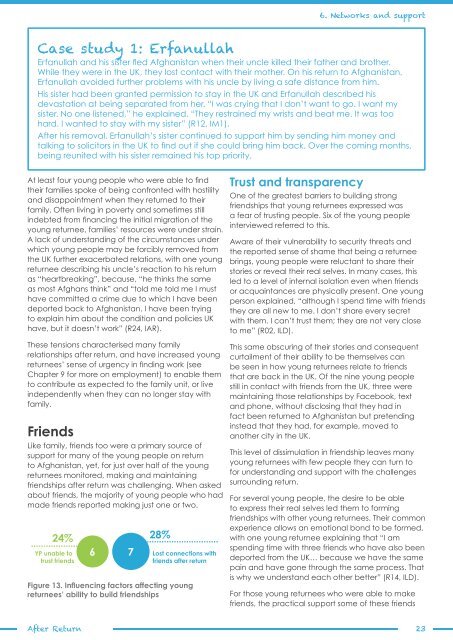After Return
After%20Return_RSN_April%202016
After%20Return_RSN_April%202016
You also want an ePaper? Increase the reach of your titles
YUMPU automatically turns print PDFs into web optimized ePapers that Google loves.
6. Networks and support<br />
Case study 1: Erfanullah<br />
Erfanullah and his sister fled Afghanistan when their uncle killed their father and brother.<br />
While they were in the UK, they lost contact with their mother. On his return to Afghanistan,<br />
Erfanullah avoided further problems with his uncle by living a safe distance from him.<br />
His sister had been granted permission to stay in the UK and Erfanullah described his<br />
devastation at being separated from her. “I was crying that I don’t want to go. I want my<br />
sister. No one listened,” he explained. “They restrained my wrists and beat me. It was too<br />
hard. I wanted to stay with my sister” (R12, IM1).<br />
<strong>After</strong> his removal, Erfanullah’s sister continued to support him by sending him money and<br />
talking to solicitors in the UK to find out if she could bring him back. Over the coming months,<br />
being reunited with his sister remained his top priority.<br />
At least four young people who were able to find<br />
their families spoke of being confronted with hostility<br />
and disappointment when they returned to their<br />
family. Often living in poverty and sometimes still<br />
indebted from financing the initial migration of the<br />
young returnee, families’ resources were under strain.<br />
A lack of understanding of the circumstances under<br />
which young people may be forcibly removed from<br />
the UK further exacerbated relations, with one young<br />
returnee describing his uncle’s reaction to his return<br />
as “heartbreaking”, because, “he thinks the same<br />
as most Afghans think” and “told me told me I must<br />
have committed a crime due to which I have been<br />
deported back to Afghanistan. I have been trying<br />
to explain him about the condition and policies UK<br />
have, but it doesn’t work” (R24, IAR).<br />
These tensions characterised many family<br />
relationships after return, and have increased young<br />
returnees’ sense of urgency in finding work (see<br />
Chapter 9 for more on employment) to enable them<br />
to contribute as expected to the family unit, or live<br />
independently when they can no longer stay with<br />
family.<br />
Friends<br />
Like family, friends too were a primary source of<br />
support for many of the young people on return<br />
to Afghanistan, yet, for just over half of the young<br />
returnees monitored, making and maintaining<br />
friendships after return was challenging. When asked<br />
about friends, the majority of young people who had<br />
made friends reported making just one or two.<br />
24%<br />
YP unable to<br />
trust friends<br />
6 7<br />
28%<br />
Lost connections with<br />
friends after return<br />
Figure 13. Influencing factors affecting young<br />
returnees’ ability to build friendships<br />
Trust and transparency<br />
One of the greatest barriers to building strong<br />
friendships that young returnees expressed was<br />
a fear of trusting people. Six of the young people<br />
interviewed referred to this.<br />
Aware of their vulnerability to security threats and<br />
the reported sense of shame that being a returnee<br />
brings, young people were reluctant to share their<br />
stories or reveal their real selves. In many cases, this<br />
led to a level of internal isolation even when friends<br />
or acquaintances are physically present. One young<br />
person explained, “although I spend time with friends<br />
they are all new to me. I don’t share every secret<br />
with them. I can’t trust them; they are not very close<br />
to me” (R02, ILD).<br />
This same obscuring of their stories and consequent<br />
curtailment of their ability to be themselves can<br />
be seen in how young returnees relate to friends<br />
that are back in the UK. Of the nine young people<br />
still in contact with friends from the UK, three were<br />
maintaining those relationships by Facebook, text<br />
and phone, without disclosing that they had in<br />
fact been returned to Afghanistan but pretending<br />
instead that they had, for example, moved to<br />
another city in the UK.<br />
This level of dissimulation in friendship leaves many<br />
young returnees with few people they can turn to<br />
for understanding and support with the challenges<br />
surrounding return.<br />
For several young people, the desire to be able<br />
to express their real selves led them to forming<br />
friendships with other young returnees. Their common<br />
experience allows an emotional bond to be formed,<br />
with one young returnee explaining that “I am<br />
spending time with three friends who have also been<br />
deported from the UK… because we have the same<br />
pain and have gone through the same process. That<br />
is why we understand each other better” (R14, ILD).<br />
For those young returnees who were able to make<br />
friends, the practical support some of these friends<br />
<strong>After</strong> <strong>Return</strong> 23


